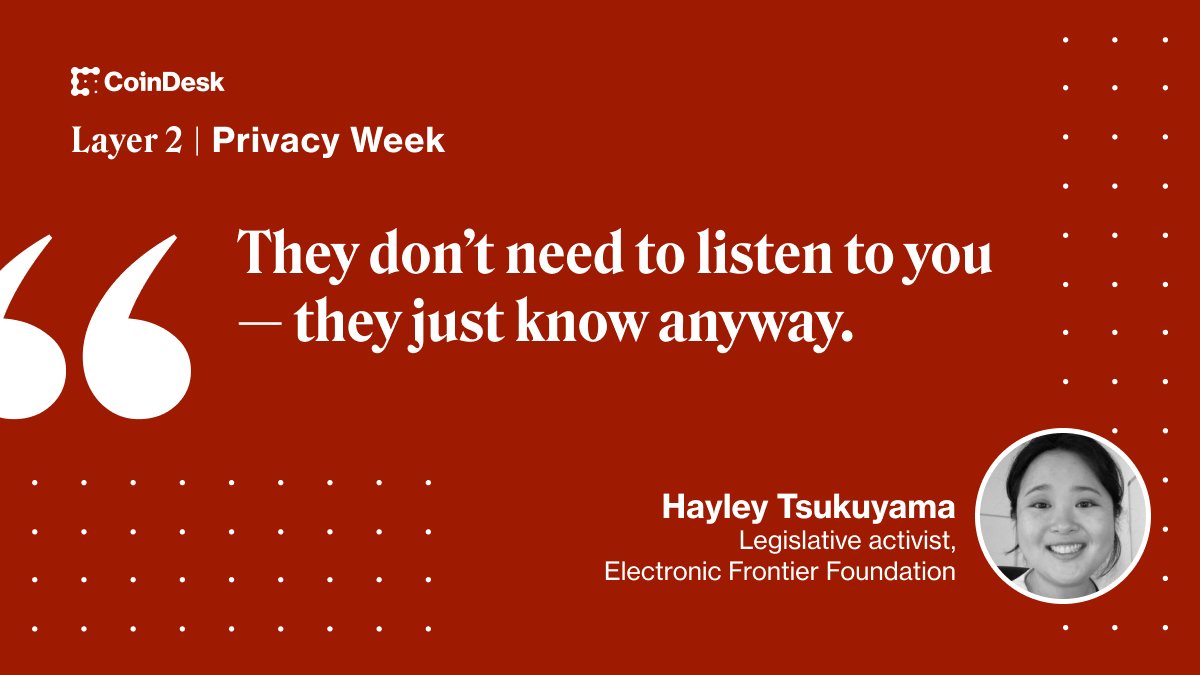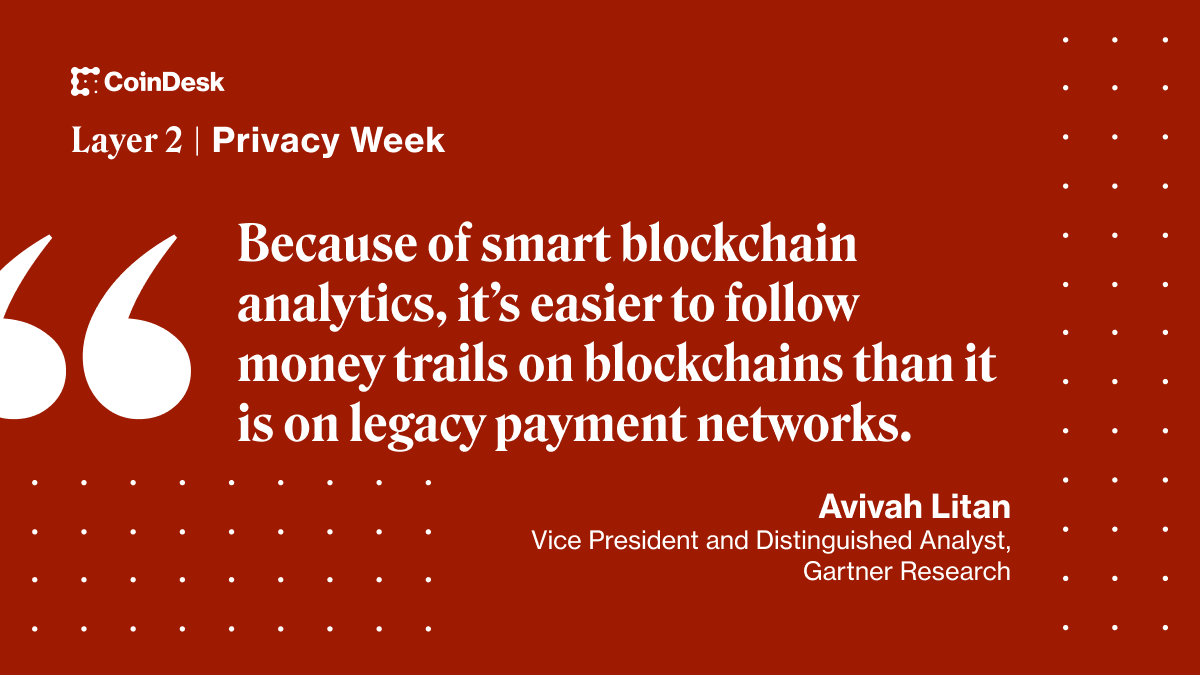
🧵 Cryptocurrency was supposed to be about privacy.
Yet 13 years after the Satoshi white paper, privacy remains hard to come by — for cryptocurrency users and everyday people alike.
#PrivacyWeek
bit.ly/34372yy
Yet 13 years after the Satoshi white paper, privacy remains hard to come by — for cryptocurrency users and everyday people alike.
#PrivacyWeek
bit.ly/34372yy
For #PrivacyWeek, CoinDesk surveyed the state of play for digital and financial privacy in 2022, in crypto and beyond, and where it might be headed in the years and decades to come.
Here’s a look: bit.ly/34372yy
Here’s a look: bit.ly/34372yy
Did you know you can buy crypto without giving out your personal data?
Non-custodial exchanges, no-KYC apps, bitcoin ATMs and more — @baidakova reviews the available options for #PrivacyWeek.
coindesk.com/layer2/privacy…
Non-custodial exchanges, no-KYC apps, bitcoin ATMs and more — @baidakova reviews the available options for #PrivacyWeek.
coindesk.com/layer2/privacy…
Privacy is urgent, necessary and even critical to our well-being, @xychelsea says.
She shares what she’s doing to help solve this problem in a Q&A for #PrivacyWeek 👉 bit.ly/3qWpBhd
She shares what she’s doing to help solve this problem in a Q&A for #PrivacyWeek 👉 bit.ly/3qWpBhd

Taproot doesn't fully solve #Bitcoin's privacy issues. But it does pave the way for some substantial improvements.
We take a look at the improvements it brings to the table for #PrivacyWeek: bit.ly/3411ULu
We take a look at the improvements it brings to the table for #PrivacyWeek: bit.ly/3411ULu
There’s an index of privacy fears that is emblematic of our era: the rise of conspiracy theories about digital surveillance.
Many are convinced their phones are actively listening to conversations. But companies don’t need to. #PrivacyWeek
Read 👉 bit.ly/3AuY2ic
Many are convinced their phones are actively listening to conversations. But companies don’t need to. #PrivacyWeek
Read 👉 bit.ly/3AuY2ic

The rebels of cryptography lost their bid to build a privacy-protecting internet but there's a new hope for tomorrow.
@Dan_Jeffries1 takes a closer look for #PrivacyWeek: bit.ly/3fRpEnR
@Dan_Jeffries1 takes a closer look for #PrivacyWeek: bit.ly/3fRpEnR
"Privacy is one of those things that many people don't value until the moment it's gone. Then it becomes the most important thing in the world," @MarcHochstein says.
Watch him break down what to expect from #PrivacyWeek on CoinDesk.TV: coindesk.com/video/recent-v…
Watch him break down what to expect from #PrivacyWeek on CoinDesk.TV: coindesk.com/video/recent-v…
Be sure to bookmark and follow CoinDesk’s #PrivacyWeek series 👉 bit.ly/3Aqg3hv
We’ll be dropping new stories all week. Coming tomorrow: How popular are cryptocurrency mixers? We’ll take a look at the data.
How important is crypto privacy to you?
We’ll be dropping new stories all week. Coming tomorrow: How popular are cryptocurrency mixers? We’ll take a look at the data.
How important is crypto privacy to you?
The need for privacy exists if crypto will ever take on a mainstream role in payments, finance and banking.
Yet mixer transactions make up a small fraction of crypto activity.
@CoinDeskData's @TedDeFi and @gckaloudis look at the data for #PrivacyWeek: bit.ly/3462GqK
Yet mixer transactions make up a small fraction of crypto activity.
@CoinDeskData's @TedDeFi and @gckaloudis look at the data for #PrivacyWeek: bit.ly/3462GqK
It’s a “creepy feeling” to know Big Tech is watching you.
But what if we nailed privacy infrastructure, fixed the policy and abolished the forces behind that feeling?
@jeffwilser explores what that world might look like for #PrivacyWeek: coindesk.com/layer2/privacy…
But what if we nailed privacy infrastructure, fixed the policy and abolished the forces behind that feeling?
@jeffwilser explores what that world might look like for #PrivacyWeek: coindesk.com/layer2/privacy…
Even as regulators and exchanges seek to limit their adoption, privacy coins have a firm hold within the larger cryptocurrency community.
Monero $XMR embeds privacy into its protocol, setting it apart from other coins. #PrivacyWeek coindesk.com/layer2/privacy…
Monero $XMR embeds privacy into its protocol, setting it apart from other coins. #PrivacyWeek coindesk.com/layer2/privacy…
Can privacy coins like $XMR survive an increased focus on regulation?
"I think that it's going to be increasingly the case that these markets are sustainable," @benjaminopowers says.
He breaks down his story on @monero for #PrivacyWeek on "First Mover": coindesk.com/video/recent-v…
"I think that it's going to be increasingly the case that these markets are sustainable," @benjaminopowers says.
He breaks down his story on @monero for #PrivacyWeek on "First Mover": coindesk.com/video/recent-v…
For Web 3 to achieve its aims, it needs to stand on a proper foundation, writes legendary cryptographer @chaumdotcom.
Among other things, that means encryption that quantum computers can’t break. #PrivacyWeek bit.ly/35bCuv9
Among other things, that means encryption that quantum computers can’t break. #PrivacyWeek bit.ly/35bCuv9

A little-discussed provision in the U.S. infrastructure law will greatly expand the government’s warrantless surveillance of sensitive financial information.
@MartaBelcher argues the provision is unconstitutional in a #PrivacyWeek op-ed: coindesk.com/layer2/privacy…
@MartaBelcher argues the provision is unconstitutional in a #PrivacyWeek op-ed: coindesk.com/layer2/privacy…
Check in tomorrow for even more #PrivacyWeek stories 👉 bit.ly/3Aqg3hv
Until then, we want to know:
What's the most important issue in data privacy?
Until then, we want to know:
What's the most important issue in data privacy?
In a world where we're being increasingly tracked, it’s little surprise cryptocurrencies like @zcash that offer users anonymity continue to survive, despite efforts from regulators and exchanges to restrict their accessibility. #PrivacyWeek
bit.ly/3IFw8CG
bit.ly/3IFw8CG
Web 3 is the buzzy corner of crypto that spans everything from play-to-earn gaming to collectibles to DeFi.
But it seems to be repeating the same missteps of Web 2, @TorBair writes in an op-ed for #PrivacyWeek: bit.ly/3H5jtJ2
But it seems to be repeating the same missteps of Web 2, @TorBair writes in an op-ed for #PrivacyWeek: bit.ly/3H5jtJ2

Transparent blockchains are much easier platforms for tracking criminal payments than siloed legacy payment systems ever were, @avivahl writes in a #PrivacyWeek op-ed. bit.ly/3H00HCK 

What do criminals get wrong about crypto?
"They're very greedy obviously and when they go after too much money they get the headlights on them," @avivahl says.
More on her #PrivacyWeek story on the CoinDesk spotlight, sponsored by @Nexo: coindesk.com/video/recent-v…
"They're very greedy obviously and when they go after too much money they get the headlights on them," @avivahl says.
More on her #PrivacyWeek story on the CoinDesk spotlight, sponsored by @Nexo: coindesk.com/video/recent-v…
Privacy in the form of zero-knowledge proofs is key to getting companies interested using blockchains.
Without it, the tech is like the internet before encryption: interesting but not commercially viable, @pbrody writes in a #PrivacyWeek op-ed: coindesk.com/layer2/privacy…
Without it, the tech is like the internet before encryption: interesting but not commercially viable, @pbrody writes in a #PrivacyWeek op-ed: coindesk.com/layer2/privacy…
Be sure to check back tomorrow for even more #PrivacyWeek stories 👉 bit.ly/3Aqg3hv
Until then, we want to know:
What's the No. 1 threat to financial privacy?
Until then, we want to know:
What's the No. 1 threat to financial privacy?
For #PrivacyWeek, @baidakova reviewed the privacy policies of 24 major crypto platforms to see how much they know about users and how transparent they are about it.
Here’s what she found: coindesk.com/layer2/privacy…
Here’s what she found: coindesk.com/layer2/privacy…
10 things you can change about your computer, mobile and money setup to gain a little secrecy.
@sethforprivacy breaks them down for #PrivacyWeek: coindesk.com/layer2/privacy…
@sethforprivacy breaks them down for #PrivacyWeek: coindesk.com/layer2/privacy…
@sethforprivacy Data hoarders like Facebook and Google aren’t just threats to stability, they’re undermining our collective wisdom, @davidzmorris writes for #PrivacyWeek.
coindesk.com/layer2/privacy…
coindesk.com/layer2/privacy…
“Main Street doesn't want complete anonymity. It wants to use DeFi tools that strip away just enough secrets to assure that dirty money is being excluded,” @jp_koning writes for #PrivacyWeek.
coindesk.com/layer2/privacy…
coindesk.com/layer2/privacy…
Check back tomorrow for even more #PrivacyWeek stories 👉 bit.ly/3Aqg3hv
Until then, we want to know:
What will be the savior of privacy?
Until then, we want to know:
What will be the savior of privacy?
What did @ciphertrace mean when the on-chain analytics firm, now owned by @Mastercard, told the @USTreasury it uses "honeypots"?
@realDannyNelson investigates for #PrivacyWeek 👉 bit.ly/3Hb5Sjr
@realDannyNelson investigates for #PrivacyWeek 👉 bit.ly/3Hb5Sjr

• • •
Missing some Tweet in this thread? You can try to
force a refresh

















